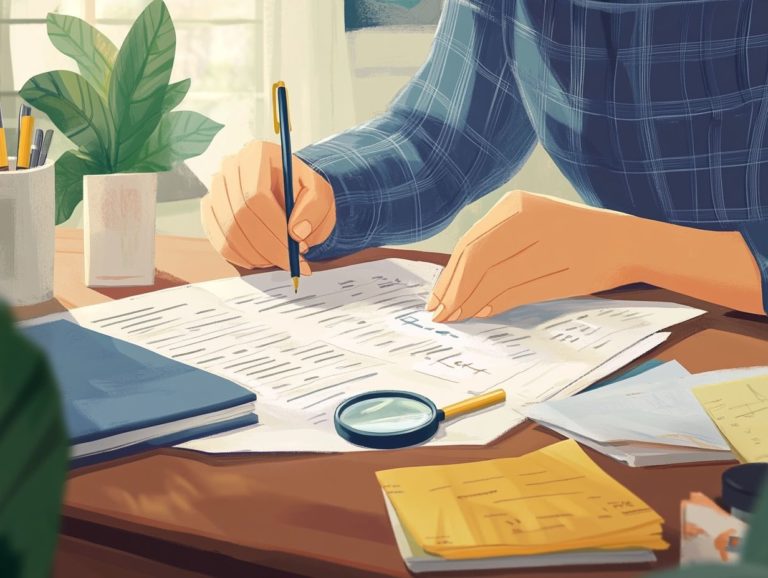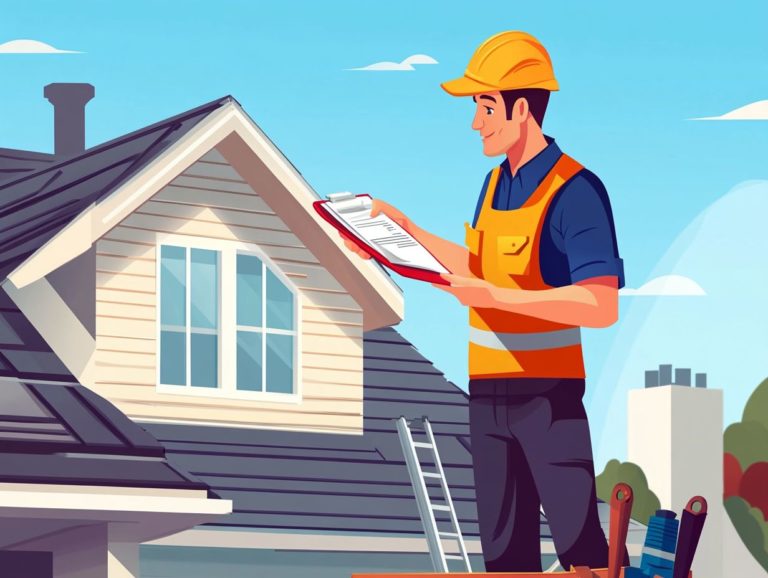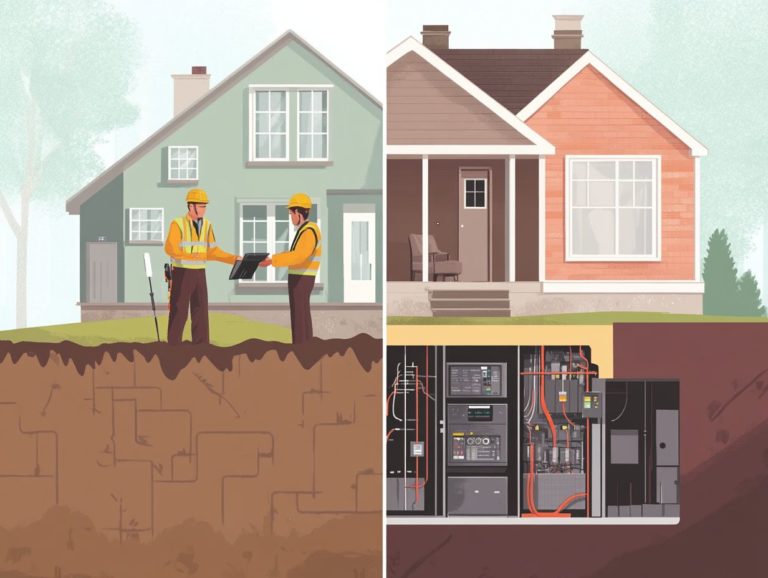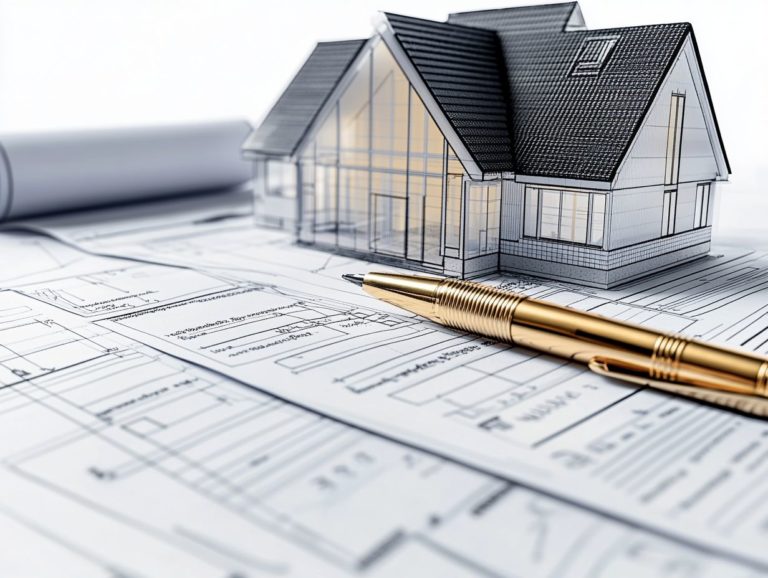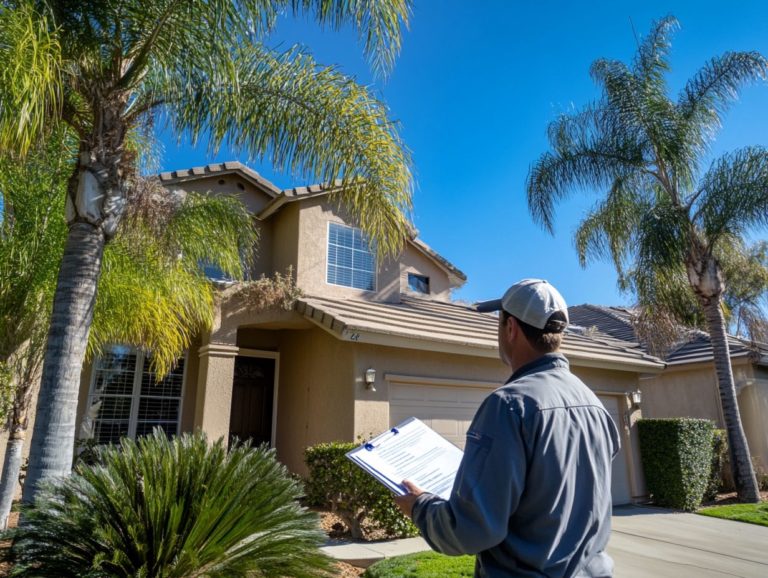5 Signs You Need a Home Inspection Soon
Thinking about purchasing a new home? Or perhaps you ve noticed unusual odors or puzzling health issues in your current space?
Home inspections are vital for ensuring your living environment remains safe and secure. Whether you ve spotted cracks in your walls or it s been over five years since your last inspection, staying proactive is essential.
This article explores five signs that indicate it s time for a home inspection, along with insights on what to expect and why it truly matters. Continue reading to protect your home investment and well-being.
Contents
- Key Takeaways:
- Ready to Buy? Here s Why an Inspection is Key!
- Dealing with Unexplained Allergies or Health Issues?
- Noticed Strange Smells or Sounds in Your Home?
- You Have Not Had a Home Inspection in Over 5 Years
- You Have Noticed Cracks or Damage to Your Home
- What Is a Home Inspection and Why Is It Important?
- Frequently Asked Questions
Key Takeaways:
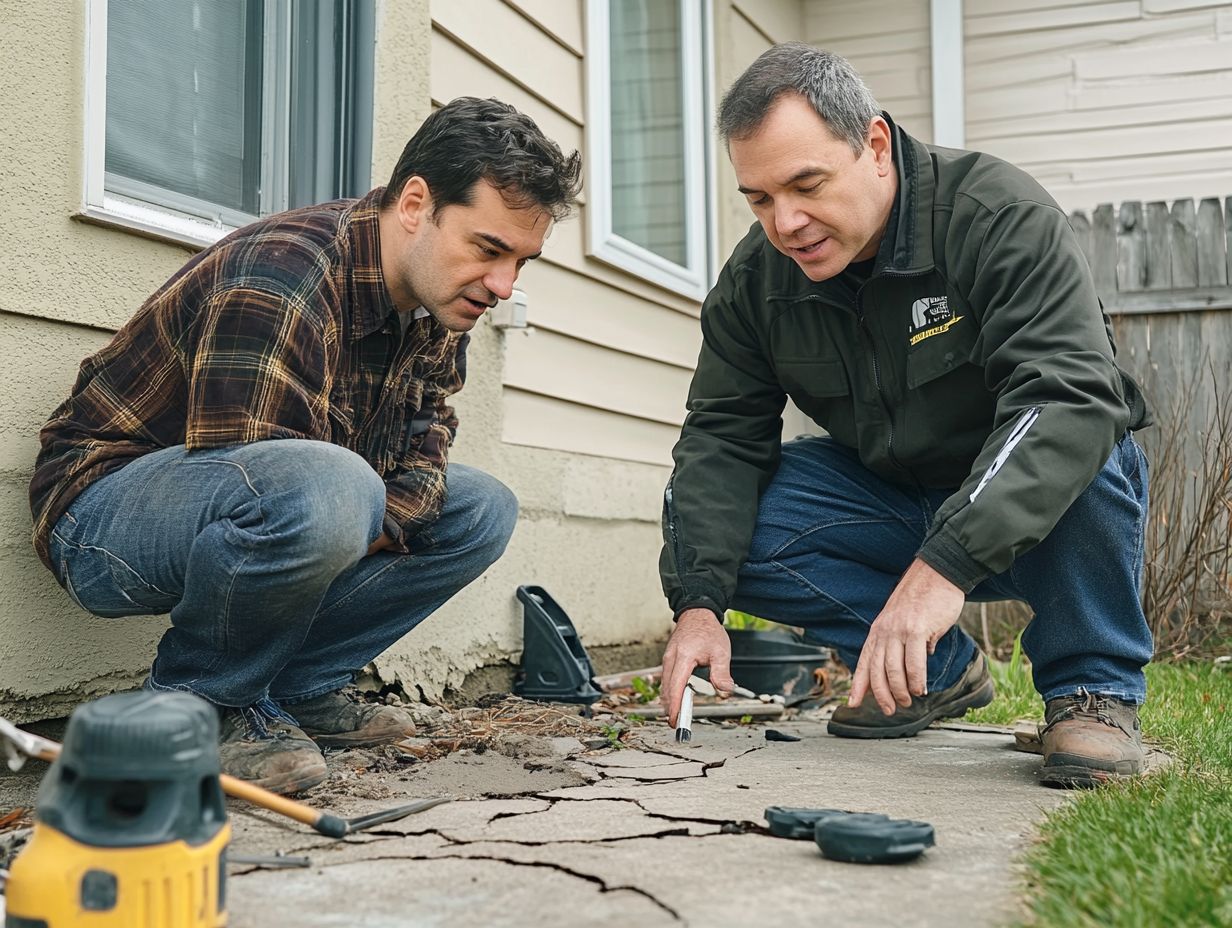
If you are planning to buy a new home, a home inspection is crucial to ensure the property is safe and sound.
Unexplained allergies or health issues could be a sign of hidden problems in your home that can be identified through a home inspection.
Strange smells or sounds in your home could indicate potential issues that can be detected through a thorough inspection.
Ready to Buy? Here s Why an Inspection is Key!
When you’re planning to buy a new home, securing a comprehensive home inspection is essential. It helps identify potential issues that could impact your investment and ensures the property meets your family’s needs.
A thorough inspection can uncover common problems, such as roof damage, HVAC malfunctions, or plumbing issues that might not be apparent during your initial viewings. Working with experienced real estate agents and inspectors in Fort Worth, Texas, can enhance your home-buying experience and provide peace of mind.
Recognizing the importance of an inspection report is vital; it’s a key tool for making informed choices. You might also uncover serious concerns like faulty foundations, pervasive mold, or water damage each of which could lead to expensive repairs later on.
A detailed inspection checklist serves as your roadmap, helping you prioritize repairs and negotiate effectively with sellers.
By using reputable inspection services, you not only protect your financial investment but also gain a clearer picture of the property’s condition. This makes your move into your new home much easier and worry-free!
Dealing with Unexplained Allergies or Health Issues?
If you re dealing with unexplained allergies or health concerns, now is the best time to invest in a comprehensive home inspection. Focus on environmental factors like mold growth, radon gas (a gas that can seep into your home and is harmful to your health), and asbestos elements that can profoundly affect your health and overall well-being.
These issues often go unnoticed, quietly undermining your quality of life. Take mold, for instance; it flourishes in damp spaces and can lead to respiratory problems and allergic reactions. Asbestos, whose fibers can become airborne, presents severe long-term health risks, including lung disease.
And let s not overlook radon, which can significantly increase the risk of serious health complications. Combine that with poor ventilation, and you have a recipe for harmful pollutants to accumulate.
By engaging in specialized inspections, you can uncover these hidden dangers, granting yourself peace of mind and paving the way for a healthier living environment.
Noticed Strange Smells or Sounds in Your Home?
Noticing strange smells or sounds can signal that something’s wrong, hinting at issues ranging from appliance malfunctions to plumbing or HVAC troubles that demand your immediate attention to prevent further damage.
While unusual odors may stem from something as simple as debris buildup in clogged gutters, they can also signal serious concerns like mold growth or faulty electrical wiring.
Similarly, persistent noises such as banging, hissing, or rattling could indicate mechanical failures within your HVAC system or plumbing leaks that could worsen without timely intervention.
This is why regular home inspections are crucial. They not only help identify potential problems but also provide peace of mind, ensuring that minor issues are caught early before they escalate into significant, costly repairs.
In conclusion, recognizing these signs and acting on them can protect your home and health. Don’t wait—learn the 5 things to know about home inspections and schedule your home inspection today!
You Have Not Had a Home Inspection in Over 5 Years
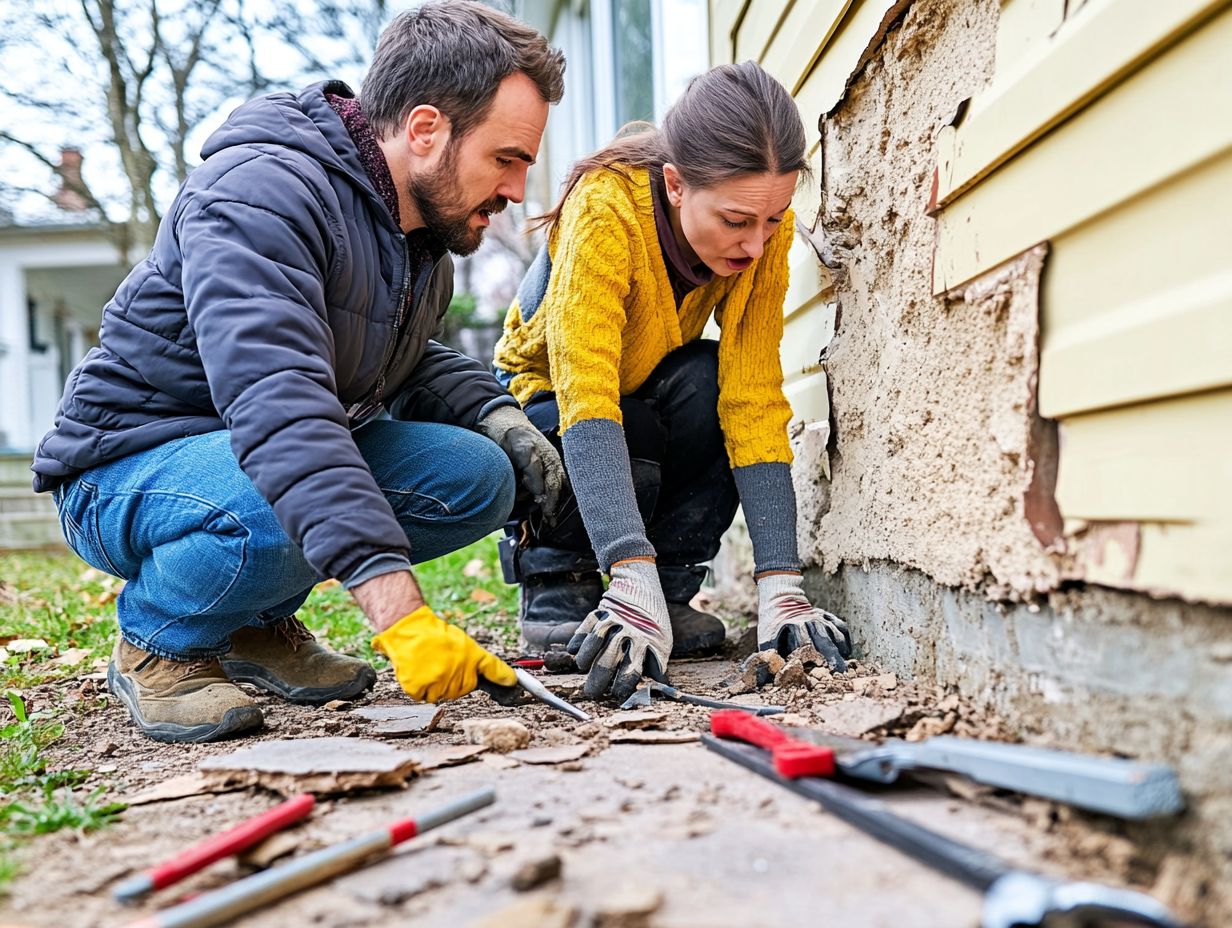
If you haven’t had a home inspection in over five years, it’s crucial to act now. Check your property’s condition. Ongoing maintenance and potential structural damage can significantly affect your safety and the long-term value of your home.
Regular home maintenance and inspections are vital for identifying hidden issues that might otherwise go unnoticed. Water intrusion can lead to mold, while foundation cracks threaten your structure’s integrity.
Even minor problems can snowball into expensive repairs if left unchecked. By engaging inspection services, you gain access to detailed reports about your home’s current state, complete with estimates for necessary repairs.
This proactive approach creates a safer living environment and safeguards your property’s value over time.
You Have Noticed Cracks or Damage to Your Home
Noticing cracks or other damage in your home can be alarming. These often signal structural issues that demand immediate attention from a qualified home inspector.
It’s essential to have a professional assess the severity and necessary repairs. You may encounter various types of cracks as a homeowner. Foundation cracks can lead to serious structural problems, while wall cracks might indicate settling or shifting issues.
Water damage, often stemming from leaks or poor drainage, can show up as unsightly stains, mold growth, or even rotting wood. Each of these poses health risks and jeopardizes your home’s stability.
Understanding these issues through a comprehensive inspection report is vital. Such a report reveals the extent of the damage and offers insights into potential repair costs.
With this knowledge, you can make informed decisions about necessary repairs and future preventive measures, ensuring your home remains a safe and secure haven.
What Is a Home Inspection and Why Is It Important?
A home inspection is a thorough evaluation of a property’s condition, performed by a qualified inspector. They meticulously examine critical areas such as the roof, heating, ventilation, and air conditioning (HVAC) system, plumbing, electrical systems, and foundation.
This process provides essential insights that can significantly impact both home buyers and sellers during their real estate dealings. A systematic checklist guides the inspector, ensuring that no detail is overlooked.
The findings are compiled into an inspection report, which becomes an invaluable resource for potential buyers assessing the property’s true condition and negotiating necessary repairs or price adjustments. For sellers, this report is crucial in meeting disclosure requirements and fostering transparency.
This diligence paves the way for smoother transactions and helps prevent misunderstandings, as both parties gain a clearer understanding of the home’s status.
What Are the Key Areas a Home Inspection Covers?
- Roof
- HVAC System
- Electrical System
- Plumbing
- Foundation
Each of these components can unveil critical insights into the home’s safety and functionality. As the inspector examines the roof, they ll look for signs of wear, leaks, or structural damage issues that could lead to hefty repair bills if not addressed promptly.
The HVAC system is evaluated for efficiency and potential hazards, ensuring comfortable living conditions while saving on energy costs. The electrical system undergoes thorough scrutiny for outdated wiring or safety concerns, as lapses here can pose fire risks.
Plumbing evaluations focus on leaks and water pressure, which may indicate serious underlying problems that could affect water quality. Foundation integrity is paramount; any cracks or shifts can jeopardize the property s stability.
A comprehensive inspection checklist is essential for inspectors, guiding their assessment and ultimately influencing the quality and thoroughness of the final report you receive.
Schedule your home inspection today to protect your investment!
How Often Should a Home Inspection Be Done?

The frequency of home inspections can vary based on several factors. A good rule of thumb is to schedule a professional inspection every 1 to 5 years, especially if you notice signs of damage or have made significant changes to your property.
If you own an older home with potential structural issues or outdated systems, more frequent evaluations are wise. The maintenance history of your property is also crucial; a well-maintained home might not need inspections as often as one that has seen neglected repairs.
Be vigilant about red flags like water stains, cracks, or unusual smells. These can indicate potential problems.
While inspection costs can range from a few hundred to over a thousand dollars, investing in regular assessments can save you significant money in the long run. Addressing issues early prevents them from escalating.
What Are the Risks of Not Getting a Home Inspection?
Neglecting to get a home inspection can present serious risks, including undiscovered issues like heating, ventilation, and air conditioning (HVAC) problems, plumbing failures, or structural damage. These can lead to costly repairs and jeopardize both your safety and the value of your property.
Consider a hidden roof leak; it might not be immediately noticeable, but over time, it can lead to extensive water damage that requires a full roof replacement. Similarly, outdated electrical wiring could create serious fire hazards, often slipping under the radar during casual walkthroughs.
Conducting an inspection helps you uncover these hidden pitfalls. It also empowers you to negotiate repair costs or request necessary changes in the purchase agreement. Early detection acts as a safeguard, enabling you to make informed decisions and protect your investment.
Don’t wait until it s too late!
How Can a Home Inspection Help with Negotiations?
A thorough home inspection can significantly enhance your bargaining power in a real estate transaction. With a detailed inspection report in hand, you’ll have a comprehensive overview of necessary repairs and potential costs, which you can leverage to negotiate a better price or request repairs from the seller.
Think of this inspection report as your secret weapon at the negotiation table. Use the documented findings to justify requests for financial concessions or improvements to the property. By highlighting specific issues, like plumbing or electrical concerns, you strengthen your case for a price reduction that accurately reflects the costs of those necessary repairs.
Sellers can also benefit from the insights provided by the inspection report. By addressing buyer concerns proactively, they can offer reassurances or complete minor repairs before negotiations wrap up, leading to a smoother transaction overall.
What Should You Look for in a Professional Home Inspector?
When selecting a professional home inspector, take time to find the best inspector for your needs. Carefully evaluate their qualifications, experience, and reputation. These factors play a significant role in determining the quality of the inspection services they provide.
It s wise to seek out inspectors with relevant certifications. These credentials indicate their commitment to industry standards and ongoing education. Experience is crucial; seasoned inspectors are better at identifying potential issues that newer inspectors may miss.
Customer reviews offer valuable insights, reflecting past clients’ satisfaction and the inspector’s meticulousness. A comprehensive checklist is essential. It ensures that all critical areas of the home are thoroughly reviewed and confirms that the inspector is attuned to the unique concerns of both buyers and sellers.
Frequently Asked Questions

To protect your investment, schedule your inspection now!
What are the top 5 signs that indicate the need for a home inspection soon?
1. Unexplained odors or strange noises:
If you notice unusual smells or hear strange noises like creaking or banging, it may indicate potential problems. It’s time to schedule a home inspection to identify 5 warning signs that could save you from future issues.
2. Visible water damage:
Signs of water damage such as stains, mold, or rot are major red flags. Prompt action for a home inspection is necessary.
3. Electrical or plumbing issues:
Frequent power outages, flickering lights, or plumbing leaks require immediate attention. A professional home inspection can uncover the root cause.
4. Age of the property:
If your home is over 20 years old, it s wise to get an inspection. This helps identify wear and tear and any safety hazards.
5. Planning to sell or buy a home:
Whether selling or buying, a home inspection is essential. It ensures the property is in good condition and helps avoid costly surprises later.
How can a home inspection benefit homeowners?
A home inspection provides crucial details about your property. It highlights potential repairs and necessary maintenance tasks.
Yes! Home inspections can reveal hidden issues that might be missed otherwise. Inspectors have the expertise and tools to find problems with your home’s structure, electrical, or plumbing systems.
How long does a home inspection typically take?
The length of a home inspection varies based on the size and condition of the property. Typically, it takes 2-4 hours. Larger or older homes may require more time.
Should I attend the home inspection?
Don’t miss the chance to attend your home inspection! You can ask questions and see any potential issues firsthand, which helps you understand your property better.

